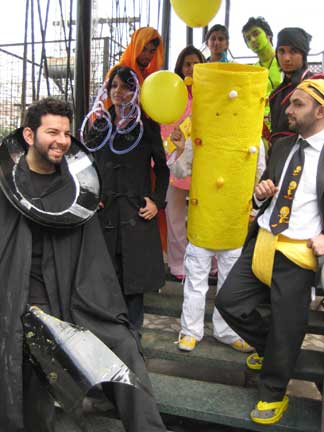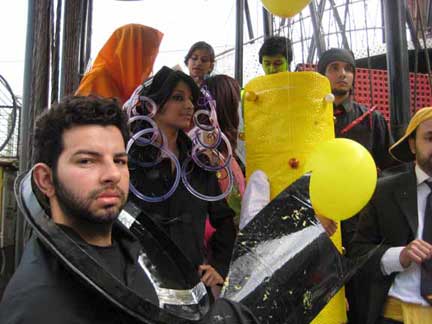Color Symbolism Workshop
Visual Communications Department - Beaconhouse National University - Lahore, Pakistan
Color symbolism was the focus of a color workshop for the third-year visual communications students at Beaconhouse National University in Lahore, Pakistan. The assignment required that each choose a favorite color and address what the color meant to him or her. Next, they had to create a costume or headpiece that reflected the symbolism as a metaphor. Finally they had to perform a mime in the costume, separately and as part of a group.

The results reflected many “universal’ meanings of colors and several very personal and regional interpretations. Note: Special appreciation to their teacher Umar Hameed and T.A. Mohsin Shafi. The following images are some of the most interesting results.
Black

Amna chose black as a symbol of self-containment. A silky cocoon enveloped the upper part of here body.

The "skull cap" consisted of several black zippers that criss-crossed over her head. A perfect metaphor!
Blue
Maria chose blue as symbol of change and evolution of color symbolism. The result was a pale blue burqa (peaceful) on the outside with a darker blue garment (tragic) inside.
The colors and the costume represented her concerns for the persecution of the women and children in Palestine.
Of note: The inner costume consisted of darker shades of blue. Several blue-tinged rocks were under her belt. The nails in her blue shoes and other details in the costume represented the violence in Palestine
Lime Green

Siddiq chose lime green as a symbol of silence - and also how this color symbolizes something that can't be ignored. His was one of the most personal interpretations of colors.

This costume was quite elaborate. He covered his body in lime green paint, ropes and lights. His mime performance was superb and successfully communicated his personal interpretation of lime green.
Orange and Pink

Farrukh chose orange as a symbol of hope. Zahra chose pink as a symbol of feminine power.
White

Zarrar chose white as a symbol of purity and the potential for corruption. He wore a turban that glowed with white lights at the top (purity) with dirty socks attached to the crown (corruption). It's worth noting the symbolism of shoes and dirty feet in the Middle East. (Zarrar is from the Northwest region of Pakistan.
Purple
Shehzil chose purple as a symbol of metamorphosis. Her headpiece consisted of plastic tubes filled with blue and red liquid that merged to create purple. It was a very clever use of oil and water to create the separate colors.
Group Pictures

Group 1
Details
Front row: Ali (aka Happy) in black as a symbol of power
Middle: Yasmin in yellow bubble wrap as a symbol of happiness.

Group 2
Details
Front row: Zarrar (white/purity and corruption),
Waqas (silver/happiness), and Zuna (brown/seduction)
Learn more


